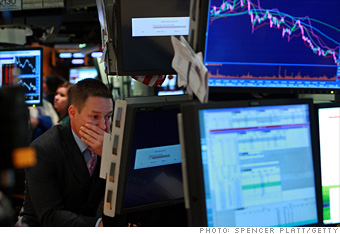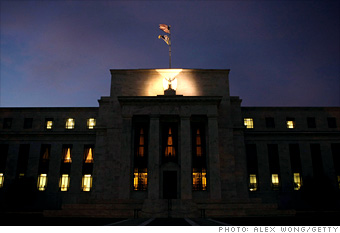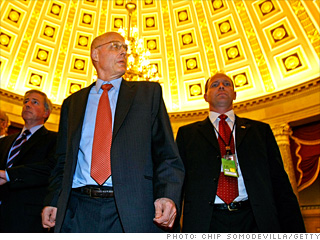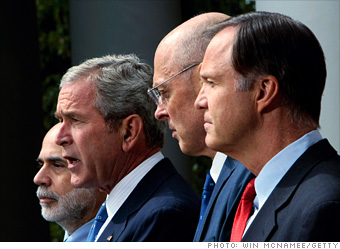A writefree. Production
Title
The Bailout Plan: Worst recession ever looms published to writefree.
Report sent to writefree. about The Bailout Plan: Worst recession ever looms
This article is located at
writefree.
"Our time has run out," said Rep. Spencer Bachus, R-Ala., the ranking Republican on the House Financial Services Committee. "We're going make a decision. There are no other choices, no other alternatives."
Added Frank: "Today is the decision day. If we defeat this bill today, it will be a very bad day for the financial sector of the American economy."
Boehner told his members, many of whom objected to the measure, that they had to accept something he and many of them found distasteful.
"If I didn't think we were on the brink of an economic disaster, it would be the easiest thing to say no to this," Boehner said. But he said lawmakers needed to do what was in the best interest of the country.
One lawmaker who voted against the bill, Rep. John Culberson, R-Texas, said the measure would leave a huge burden on taxpayers. "This legislation is giving us a choice between bankrupting our children and bankrupting a few of these big financial institutions on Wall Street that made bad decisions," he said. Culberson voted against the bill.
Other conservative Republicans who voted "no" argued the bill would be a blow against economic freedom.
Thaddeus McCotter, R-Mich., said the bill posed a choice between the loss of prosperity in the short term or economic freedom in the long term. He said once the federal government enters the financial marketplace, it will not leave. "The choice is stark," he said.
Some Democrats voted against the bill for not doing enough to help taxpayers facing foreclosure or unemployment and accused proponents of moving too fast.
"Like the Iraq war and Patriot Act, this bill is fueled by fear and haste," said Lloyd Doggett, D-Texas.
The runup to the vote
The debate followed a weekend of marathon negotiations between lawmakers and administration officials to hammer out legislation.
Leading House Republicans signed on to the proposal on Sunday after expressing earlier reservations.
The core of the bill is based on Paulson's request for the authority to purchase troubled assets from financial institutions, so banks can resume lending and the credit markets, now virtually frozen, can begin to operate more normally.
Democrats and Republicans - concerned about the potential cost - added several conditions and restrictions to protect taxpayers on the downside and give them a chance at some of the potential upside if the companies benefit from the plan.
The turmoil in Washington comes amid great upheaval in the nation's financial system.
Banks and Wall Street firms, worried about both their own needs for cash and the condition of other institutions, essentially stopped loaning money to one another in recent weeks. That choked off the money being made available on Main Street in the form of mortgage loans, business loans and other consumer borrowing.
The crisis stems from problems in mortgage-backed securities, which saw their value plunge as home prices have gone into their worst slide since the Great Depression and foreclosures have soared to record levels.
In turn, the market for trillion of dollars worth of those securities held by major firms evaporated, sending them down to fire-sale prices and raising the risk of widespread failures among the nation's major financial firms.
On Monday, the Federal Deposit Insurance Corp., which insures deposits at failed banks, arranged for the sale of the banking assets of Wachovia (WB, Fortune 500), the nation's No. 4 bank holding company, to Citigroup (C, Fortune 500) for $2.2 billion in stock.
That follows three weeks of other shocks: the Treasury Department's seizure of mortgage finance firms Fannie Mae (FNM, Fortune 500) and Freddie Mac (FRE, Fortune 500); Wall Street firm Lehman Brothers' bankruptcy filing; rival Merrill Lynch (MER, Fortune 500) purchase by Bank of America (BAC, Fortune 500).
In addition, the Fed bailed out insurance giant American International Group (AIG, Fortune 500), loaning it $85 billion in return for a nearly 80% stake. Washington Mutual (WM, Fortune 500), the nation's largest savings and loan, became the largest bank failure in history.
After months of attempts by regulators to fix the problems, the bailout was seen by many as the most comprehensive effort yet. Proponents vowed late Monday to keep trying.
Sen. Judd Gregg, R-N.H., a lead negotiator in the bailout bill negotiations said, "If we don't act promptly and effectively, then many people are going to lose their jobs." To top of page
Major indexes suffered their biggest percentage declines since the 1987 crash as the government's bailout plan was defeated Monday
The fate of the government's $700 billion financial bailout plan was thrown into doubt Monday as the House rejected the controversial measure.
The next steps were unclear. The abrupt defeat left the Bush administration and congressional leaders scrambling to figure out whether to renegotiate the bill and introduce it again as soon as Thursday or to try other options.
Stock markets reacted violently. Investors who had been counting on the rescue plan's passage sent the Dow Jones industrial average down well over 700 points. The stock gauge closed 778 points lower - nearly 7%. (Full coverage)
The measure, which is designed to get battered lending markets working normally again, needed 218 votes for passage. But it came up 13 votes short of that target, with a final vote of 228 to 205 against. Two-thirds of Democrats and one-third of Republicans voted for the measure.
President Bush, who earlier in the day said he was confident the bill would pass, said he was "very disappointed" by the House vote. Treasury Secretary Henry Paulson, speaking at the White House, said he will continue to "use all the tools available to protect" the economy.
Republican leaders, who had pushed their reluctant members to vote for the bill, pointed the finger for the failure at a speech given Monday by Speaker Nancy Pelosi, D-Calif.
Pelosi, speaking on the House floor, had blamed the nation's economic problems on "failed Bush economic policies."
House minority leader John Boehner, R-Ohio, said after the vote that passage would have been possible if it had not been for Pelosi's "partisan speech."
Rep. Barney Frank, D-Mass., one of the main congressional negotiators, dismissed the GOP claim that Pelosi's speech was responsible for Republicans voting against the bill. "Because somebody hurt their feelings, they decided to hurt the country," Frank said. "That's not plausible."
'Our time has run out'
The four-hour debate that preceded Monday's vote included impassioned pleas for and against the measure from Democrats and Republicans alike. Party leaders told members that the only way to protect the economy from a spreading credit crunch was to vote for the difficult-to-swallow measure.
"Our time has run out," said Rep. Spencer Bachus, R-Ala., the ranking Republican on the House Financial Services Committee. "We're going make a decision. There are no other choices, no other alternatives."

The fate of the government's $700 billion financial bailout plan was thrown into doubt Monday as the House rejected the controversial measure.
Wall Street was pinning its hopes on the government's $700 billion financial system rescue plan. But the fervently wished-for bailout was rejected Monday by the House of Representatives in a stunning turn of events, and investors reacted with a vengeance. Major U.S. stock indexes plummeted Monday in one of their worst sessions ever.
The ugliness was widespread, with major indexes posting their worst percentage declines since the 1987 stock market crash. The Dow industrials fell 5.4%, the S&P 500 sank 7.8%, and the Nasdaq plunged a jaw-dropping 9.1%. The Dow suffered its biggest-ever closing loss in point terms:
The next steps were unclear. The abrupt defeat left the Bush administration and congressional leaders scrambling to figure out whether to renegotiate the bill and introduce it again as soon as Thursday or to try other options.
Stock markets reacted violently. Investors who had been counting on the rescue plan's passage sent the Dow Jones industrial average down well over 700 points. The stock gauge closed 778 points lower - nearly 7%. (Full coverage)
The measure, which is designed to get battered lending markets working normally again, needed 218 votes for passage. But it came up 13 votes short of that target, with a final vote of 228 to 205 against. Two-thirds of Democrats and one-third of Republicans voted for the measure.
President Bush, who earlier in the day said he was confident the bill would pass, said he was "very disappointed" by the House vote. Treasury Secretary Henry Paulson, speaking at the White House, said he will continue to "use all the tools available to protect" the economy.
Republican leaders, who had pushed their reluctant members to vote for the bill, pointed the finger for the failure at a speech given Monday by Speaker Nancy Pelosi, D-Calif.
Pelosi, speaking on the House floor, had blamed the nation's economic problems on "failed Bush economic policies."
House minority leader John Boehner, R-Ohio, said after the vote that passage would have been possible if it had not been for Pelosi's "partisan speech."
Rep. Barney Frank, D-Mass., one of the main congressional negotiators, dismissed the GOP claim that Pelosi's speech was responsible for Republicans voting against the bill. "Because somebody hurt their feelings, they decided to hurt the country," Frank said. "That's not plausible."
'Our time has run out'
The four-hour debate that preceded Monday's vote included impassioned pleas for and against the measure from Democrats and Republicans alike. Party leaders told members that the only way to protect the economy from a spreading credit crunch was to vote for the difficult-to-swallow measure.
"Our time has run out," said Rep. Spencer Bachus, R-Ala., the ranking Republican on the House Financial Services Committee. "We're going make a decision. There are no other choices, no other alternatives."
Added Frank: "Today is the decision day. If we defeat this bill today, it will be a very bad day for the financial sector of the American economy."
Boehner told his members, many of whom objected to the measure, that they had to accept something he and many of them found distasteful.
"If I didn't think we were on the brink of an economic disaster, it would be the easiest thing to say no to this," Boehner said. But he said lawmakers needed to do what was in the best interest of the country.
One lawmaker who voted against the bill, Rep. John Culberson, R-Texas, said the measure would leave a huge burden on taxpayers. "This legislation is giving us a choice between bankrupting our children and bankrupting a few of these big financial institutions on Wall Street that made bad decisions," he said. Culberson voted against the bill.
To make the legislation more politically palatable, the bill calls for the government, as an owner of a large number of mortgage securities, to exert influence on loan servicers to modify more troubled loans to help prevent additional foreclosures.

It also provides that the government will take equity in the firms that sell the securities to the government, and limits pay packages for top executives.

The legislation comes amid great upheaval in the nation's financial system. On Monday morning, the Federal Deposit Insurance Corp., which insures deposits at failed banks, arranged for the sale of the banking assets of Wachovia (WB, Fortune 500), the nation's No. 4 bank holding company, to Citigroup (C, Fortune 500) for $2.2 billion in stock.


That follows three weeks of other shocks: the Treasury Department's seizure of mortgage finance firms Fannie Mae (FNM, Fortune 500) and Freddie Mac (FRE, Fortune 500); Wall Street firm Lehman Brothers' bankruptcy filing; rival Merrill Lynch (MER, Fortune 500) purchase by Bank of America (BAC, Fortune 500).

In addition, the Fed bailed out insurance giant American International Group (AIG, Fortune 500), loaning it $85 billion in return for a nearly 80% stake. while Washington Mutual (WM, Fortune 500), the nation's largest savings and loan, became the largest bank failure in history.

Can the economy pull an Indiana Jones and avoid a recession ... Danger of
recession looms, with early ... said he doesn't recall
ever seeing a formal forecast of a
recession. ... stock market welcomes
bailout plan; indexes off early highs;
Worst is ...
more ...go to websiteCachedEuropean recession looms as Spain crumbles - Telegraph European
recession looms as Spain crumbles By ... We can't exclude a
recession," he said. Spain is now spiralling into the
worst crisis since ... bubble by now, would have to
bail out ...
more ...go to websiteCachedS&P 500 Worst Week In 5 Years - Word on the Street - CNBC.com The headline: S&P On Pace For
Worst January
Ever...
Recession Fears Spreading ... Over Cholesterol Drug, Anti-Depressants
Loom ...
Bailout Plan is a Good Idea
more ...go to websiteCachedRecession and Depression - Blogrunner The ongoing collapse,
bail-
out and buy-out of Wall ... Warning that a "long and painful
recession" could
loom unless the ... there is no alternative to his $700 billion
bailout plan.
more ...go to websiteCachedBoeing Under Pressure From Union Strike Action as Recession Looms ... ... Under Pressure From Union Strike Action as
Recession Looms ... The Paulson
Bail-
Out Plan is Mortgage Fraud on Historic Scale ... week, labor and management seem as far apart as
ever.
more ...go to websiteCached
As Bailout Looms, Fear Is Market's Biggest Problem Market analysts have been looking for a bottom
ever since the ... as well as in making sound personal finance decisions as a
recession of uncertain depth and length
looms. ... Paulson:
Plan is NOT a
Bailoutmore ...go to websiteSource: CNBC
NewsDateTime: 6 hours agoBailout Would Come In Stages That Congress Could Halt This
bailout scam will not prevent a large number of bank failures, nor will ... is, the dollar will continue to de-value and the threat of a deeper
recession or a depression
looms. ... Thomas Jefferson said, "If the America people
ever allow private banks to ...
more ...go to websiteSource: Common Dreams
NewsDateTime: 7 hours agoSeptember 2008 ... S. financial institutions whose collapse helped trigger a $700 billion
bailout plan by ... It won't be one of the
worst-hit cities -- it's not going to be a Miami or San ... it doesn't seem like a substantial drop yet, have wondered when, if
ever ...
more ...go to websiteSource: Weblogs.baltimoresun.com
NewsDateTime: 9/25/2008'New Map' Looks Much Like the Old ... that a presidential candidate wants to advertise as America faces its
worst ... blamed the economic meltdown on our “nation of whiners” and “mental
recession ... bold leader willing to set politics aside to save an endangered financial
bailout plan ...
more ...go to websiteSource: AOL
NewsDateTime: 9/21/2008Gingrich: Bush ‘exhausted’ and Cheney ‘marginalized’ The Bush administration yesterday proposed a historic $500 billion
bailout of ... in Wisconsin and Minnesota, did not react specifically to the emerging
plan in ... Because Bush didn’t want to whisper the word “
recession” we now have to spend a ...
more ...go to websiteSource: Atlanta Journal Constitution
NewsDateTime: 9/20/2008n Sunday evening, the House Republican working group, which stringently opposed earlier drafts of the plan and offered a counterproposal, indicated it would support the bill, and its members are encouraging other Republicans in the House to do the same.
"Nobody wants to have to support this bill, but it's a bill that we believe will avert the crisis that's out there," House Minority Leader John Boehner, R-Ohio, told reporters.
But the bill did draw some opposition during the morning debate.
Rep. John Culberson, R-Texas, said the measure would leave a huge burden on taxpayers. "This legislation is giving us a choice between bankrupting our children and bankrupting a few of these big financial institutions on Wall Street that made bad decisions," he said.
Other conservative Republicans argued the bill would be a blow against economic freedom.
Thaddeus McCotter, R-Mich., said the bill posed a choice between the loss of prosperity in the short term or economic freedom in the long term. He said once the federal government enters the financial market place, it will not leave. "The choice is stark," he said.
But there were also Democrats who opposed the bill for not doing enough to help those who taxpayers facing foreclosure or needing unemployment benefits extended, or taxing Wall Street to pay for the rescue package.
"Like the Iraq war and patriot act, this bill is fueled by fear and haste," said Lloyd Doggett, D-Texas.
The crisis and a proposed fix
Banks and Wall Street firms, worried about both their own needs for cash and the condition of other institutions, essentially stopped loaning money to one another in recent weeks. That choked off the money being made available on Main Street in the form of mortgage loans, business loans and other consumer borrowing.
The crisis stems from problems in mortgage-backed securities, which saw their value plunge as home prices have gone into their worst slide since the Great Depression and foreclosures have soared to record levels. In turn, the market for trillion of dollars worth of those securities held by major firms evaporated, sending them down to fire sale prices and raising the risk of widespread failures among the nation's major financial firms.
Under the plan, Treasury will buy the mortgage backed securities, either directly from the firms or through an auction process. It may also arrange to provide guarantees for the securities up to their original values in return for premiums they would charge current holders of the securities.
To make the legislation more politically palatable, the bill calls for the government, as an owner of a large number of mortgage securities, to exert influence on loan servicers to modify more troubled loans to help prevent additional foreclosures. It also provides that the government will take equity in the firms that sell the securities to the government, and limits pay packages for top executives.
The legislation comes amid great upheaval in the nation's financial system. On Monday morning, the Federal Deposit Insurance Corp., which insures deposits at failed banks, arranged for the sale of the banking assets of Wachovia (WB, Fortune 500), the nation's No. 4 bank holding company, to Citigroup (C, Fortune 500) for $2.2 billion in stock.
That follows three weeks of other shocks: the Treasury Department's seizure of mortgage finance firms Fannie Mae (FNM, Fortune 500) and Freddie Mac (FRE, Fortune 500); Wall Street firm Lehman Brothers' bankruptcy filing; rival Merrill Lynch (MER, Fortune 500) purchase by Bank of America (BAC, Fortune 500).
In addition, the Fed bailed out insurance giant American International Group (AIG, Fortune 500), loaning it $85 billion in return for a nearly 80% stake. while Washington Mutual (WM, Fortune 500), the nation's largest savings and loan, became the largest bank failure in history.
Videos from YouTube Title: Palin: Bailout is about healthcare!
Categories: News,bailout,couric,news,cbs,thinkprogres,healthcare,palin,
Published on: 9/25/2008 11:25:46 AM
Title: Go Viral: STOP THE BAILOUT OR.... DEPRESSION?
Categories: $700,News,bailout,commentary,billion,news,grassroots,depression,outreach,analysis,
Published on: 9/27/2008 4:23:10 PM
Title: Congressman Ron Paul Schools Bernanke on the Bailout Plan
Categories: Price,Monetary,Wall,Bail,Constitutionality,News,Bailout,Ron,Bernanke,Street,Out,Authority,Debt,Fixing,Federal,Paul,Depression,
Published on: 9/24/2008 11:32:51 AM
Title: Let's Play "WALLSTREET BAILOUT" The Rules Are... Rep Kaptur
Categories: military,economy,congress,taxcuts,gitmo,habeas,News,congresswoman,relief,mama,bush,kaptur,iraq,cheney,bill,corpus,
Published on: 9/22/2008 8:03:52 PM
Title: Ron Paul Fox News 9/17/08 AIG bailout
Categories: News,Fox,Baldwin,Ron,McKinney,News,Paul,Nader,
Published on: 9/17/2008 3:23:30 PM






 The fate of the government's $700 billion financial bailout plan was thrown into doubt Monday as the House rejected the controversial measure.
The fate of the government's $700 billion financial bailout plan was thrown into doubt Monday as the House rejected the controversial measure.
 It also provides that the government will take equity in the firms that sell the securities to the government, and limits pay packages for top executives.
It also provides that the government will take equity in the firms that sell the securities to the government, and limits pay packages for top executives.
 The legislation comes amid great upheaval in the nation's financial system. On Monday morning, the Federal Deposit Insurance Corp., which insures deposits at failed banks, arranged for the sale of the banking assets of Wachovia (WB, Fortune 500), the nation's No. 4 bank holding company, to Citigroup (C, Fortune 500) for $2.2 billion in stock.
The legislation comes amid great upheaval in the nation's financial system. On Monday morning, the Federal Deposit Insurance Corp., which insures deposits at failed banks, arranged for the sale of the banking assets of Wachovia (WB, Fortune 500), the nation's No. 4 bank holding company, to Citigroup (C, Fortune 500) for $2.2 billion in stock.

 That follows three weeks of other shocks: the Treasury Department's seizure of mortgage finance firms Fannie Mae (FNM, Fortune 500) and Freddie Mac (FRE, Fortune 500); Wall Street firm Lehman Brothers' bankruptcy filing; rival Merrill Lynch (MER, Fortune 500) purchase by Bank of America (BAC, Fortune 500).
That follows three weeks of other shocks: the Treasury Department's seizure of mortgage finance firms Fannie Mae (FNM, Fortune 500) and Freddie Mac (FRE, Fortune 500); Wall Street firm Lehman Brothers' bankruptcy filing; rival Merrill Lynch (MER, Fortune 500) purchase by Bank of America (BAC, Fortune 500).




